#TA meta
Text
The Nine Circles of Hell: Dead Friend Forever, Episode 7
First, a trigger warning: I'll be discussing themes of revenge porn, grooming, statutory rape, sexual coercion.
I'm going to discuss this episode with as much upmost care as I can, due to the sheer amount of sensitive material that came out of this week's episode I will also not being using any explicit scene screen captures from this episode. If there's anything you'd like to me to take out or want a more in depth conversation, feel free to use either of my message boxes.
Last week I said DFF had more to offer than just being a campy 90s slasher remake. While I first thought we were already in the depths of hell, thematically, with Non getting beaten by the mafia, I didn't expect this week's episode to somehow double that pain. But here we are. I was lulled into false security with the 5 minute montage of getting to know what Phee and Non's relationship was like. I should have remembered that I'm definitely watching the wrong genre when I expected more of those moments.
Non and Phee
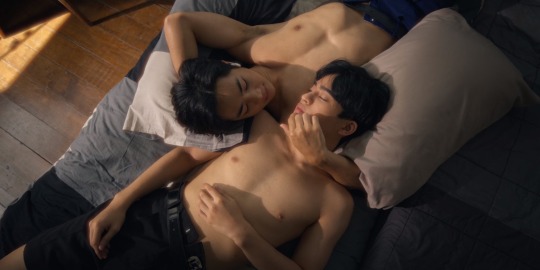
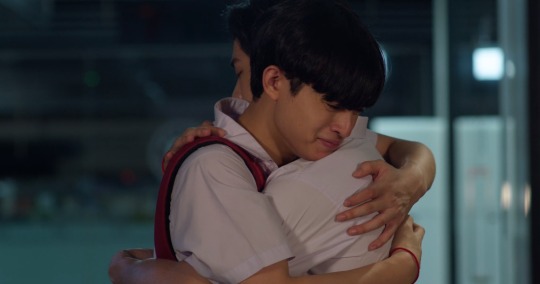
This episode really continues and expands the idea that humans are not these clear-cut, unambiguous, good-or-bad beings that idea has now been depicted through Non and his relationship with Phee. Non has so much love to give and so much want for being loved, it's what leads to Phee in the first place, but it's also what leads to his downfall. Because Non loves so much and so hard, it's also why he wasn't ecstatic that Phee had to lie to his father and say that he was involved, just to get him out of trouble with the police. What started like a sweet date turns a bit bitter, because Non is seeing the consequences of his actions not only affect himself but also the others that he loves. It's also why he couldn't tell Phee about the sheer amount he owed Tee's uncle, because he was now well aware that if Phee found out, he would get himself involved.
Non lies and manipulates Phee, he tells him time and time again that nothing happened between him and Mr. Kreng. Non swears to Phee that he isn't lying to him and that he won't keep any secrets from him anymore. It pains him to do so, he's barely holding himself together by the end of a thread thread once he's Phee's arms and his face is hidden from Phee's view. Yet, he does. He keeps it a secret how big of a hole he has found himself in, because he doesn't want to drag Phee down with him. Non says it himself to Jin, he doesn't want to be burden, he'll figure it out himself. It's a direct parallel to the bigger issues that Non is finding himself in beyond just within the 'movie set'. He has the 300 million baht hanging over his head, his parents (in his point of view) regret having him and find that he does is bring embarrassment to the family, and now he has another adult willing to give him the 300 million baht with a fake sense of care. So he found, what he believes to be, a solution that would get rid of the 300 million baht debt and all it requires is giving up a piece of himself, but at least it won't come at a cost of burdening his parents or Phee.
In trying to protect Phee, his lies ends up costing him the one he loves the most, Phee. Now from this point on, this is all speculation, but when Phee accused Non of 'always doing this', I'm not in the camp that believes that Phee is accusing Non about being a serial cheater. I see why people are in that camp, but I initially jumped to that conclusion as well. Now, I'm more in the line that Phee is accusing of Non always feeding him lies, even after explicitly promising him that he wouldn't. After putting his neck out for him, after letting Non do things his way as long as he promised to tell him the truth, Non goes back to telling lies. Phee lashes out, and at the end of the day he's still a teenager, so he hits Non's weakest point. Just get lost and die. The very words that likely haunt Phee in the present-day, now as an adult. And Non's holds the broken bracelet, punishing himself, because he knew that there was no coming back from losing his lifeline.
Non and Mr. Kreng (Please keep my trigger warnings in mind, they will be heavily discussed in this section.)
Statutory Rape. Grooming. Coerced Sexual Relations. Nonconsensual Sex. Molestation. Sexual Assault. Sexual Abuse. Those are all words to describe the relationship that occurred between Non and Mr. Keng. Let's call exactly what it is. I think I'll lose my mind if I have to see someone another person call Non a cheater. There is no cheating when there is statutory rape.
Non is literally at the end of his rope, Mr. Keng clocked that immediately. He knew that Non was isolated, that he was completely othered by his classmates, he believes that Non has nobody else to turn to, and he knows that Non is in deep in a scam that target teens. In his eyes, he found the perfect victim.
Non is taken advantage of by a person in power, a person that he should be able to trust. Non isn't naïve, he clocked that Mr. Keng wanted something from him since the moment they first met. But he is vulnerable. He's being extorted by the mafia and he sees someone offering him the money that he needs to put an end to that. In his eyes, it was a way out, a means to an end that just cost him a piece of his soul. I truly think Non rationalized it to himself as prostituting himself, because he knew that money was never coming without a price. No matter how much Mr. Keng tried to sell it as 'brotherly' love.
But at the end of the day, it does not matter what Non believed or rationalized, because Mr. Keng was the adult in the situation. He had a duty, as a teacher, to protect Non and provide a safe classroom environment. Instead he target, manipulates, and coerces Non into having sexual relations with him. He knows the power imbalance he holds, first as a teacher and then with the 300 million baht he 'gave' him. Mr. Keng, knowing that Non's not close to his 'friends', physically isolates him. He takes him to his office that's half-lit, located in a long hallway with, seemingly, very little foot traffic. He prods at Non, asking what's been bothering him and has him visibly become emotional, before offering his care. He's a complete and utter predator, in every sense of the term.
I hope he dies a long, painful death.
Non and Jin
First and foremost, whether or not Jin was ultimately the one that posted the video does not matter. Filming a classmate being sexually assaulted is still child porn at the very least and, possibly, revenge porn (if he disseminated the video) at the worst. I was on the same boat as @respectthepetty and their take that Jin had to be the worst of them all. Like they said in that post, Jin is a coward and he even admits to it. There's nothing more cowardly than hiding behind a door, filming you supposed 'friend' getting sexually abused by your teacher, and then even considering putting up on social media for revenge because your heart is broken.
Yes, Top framed Non. Yes, Por demanded (and bullied) money from Non. Yes, Tee brought Non to the mafia. Those are all very bad things, don't get me wrong. All the physical and mental abuse they put Non through was hell. Yet, Jin was the only one aware that Non had already been seeing someone, which seemingly had upset him already. Then he sees him with Mr. Keng and instead of reporting that his alleged friend was being assaulted, he gets angry and films Non at his most vulnerable point in life. Even Fluke didn't want any part of that.
Jin takes away Non's dignity. And at the end of the day, it doesn't matter whether he uploaded it online or not, he was still the one to film, transfer that file onto his computer, and contemplate whether he was going to post it or not. At every point since he found that Non and Mr. Kreng were in that room, he rendered Non powerless. That video would have never been uploaded if it hadn't existed in the first place. With just a point of a camera and click of a button, he is revictimizing Non every. single. time. that video is opened and seen by another person.
There are no words to fully describe or explain that kind of trauma that he has subjected Non to.
Final Thoughts
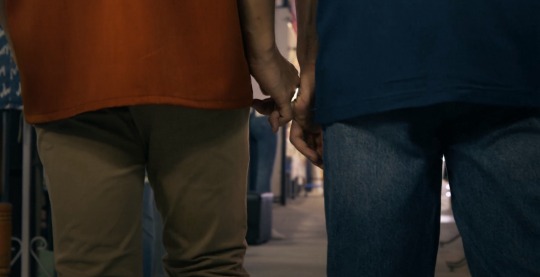
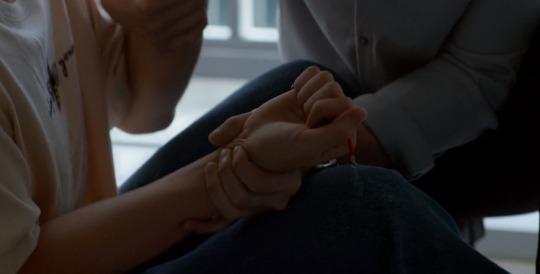
This episode was nauseating. It honestly took me about two hours just to get to the end. Usually, I can watch through a show I enjoy really quickly, but this episode was so hard to digest. And that's simply due to how realistic they are approaching the subject of Non and Mr. Keng.
Barcode and Ta really are the stars of the show. I'm not saying that the other castmates aren't amazing in their roles, but man TaBarcode really know are hitting every single emotional beat. I was never a TaBarcode nor a MacauChay girlie, but man Be On Cloud has truly brought out their best this time around. Even though I fully know we are heading towards an incredibly heart wrenching ending for PheeNon, I can't help but want to hoard and scramble for moments of them together.
It's crazy how well, everyone was able to pull their weight this episode. There were so many moments that with less talented, less experienced actors, could have fallen flat, but they didn't. Ta and Barcode's PheeNon was so incredibly heart-beating, butterfly inducing before we were brought back into their reality outside of their relationship. 2J and Barcode's scenes were.... so disgustingly real, for lack of better words. I knew that storyline was never going to end well but it had been more than I ever expected Be On Cloud to release. They're tackling such real issues that weigh on teens with incredible tact, there's no romanticizing what happened. Even Phee's reaction was so understandable when you put yourself in the shoes of a teenager.
I'll reiterate again and again, whatever you think about Be On Cloud as a management company, as a production company, they really are breaking boundaries and doing something right. Whatever happens in the second half, I think I'll be here, recovering, for a long time.
#dead friend forever#dff meta#dff the series#dff episode 7#dff non#dff Phee#dff jin#dff mr.kreng#dead friend forever the series#barcode tinnasit#ta nannakun#copper phuriwat#2J Chalach#be on cloud#boc actors#dff spoilers#pheenon#jinnon#pheejinnon#dff
293 notes
·
View notes
Text
Vulcan skin color meta (why its not green)
In the past i've seen a lot of discussion about whether we should or should not draw vulcans as green, mostly centered around antisemitism. I want to start out by saying this meta is not gonna go into much of any of that. Regardless of whether it is antisemitic for vulcans to be green or not, the truth is they aren't. They also aren't quite human colored. It isn't a technical limitation; they aren't shown as green in the show or cartoons even when orions are green. This meta will mostly concern 3 questions:
in universe, why are vulcans not green when their blood is green?
in universe, are vulcan mucus membranes and other colored tissue like lips and nipples green? If not why not?
What color would a vulcan blush (do vulcans blush?)
If you are interested in this exploration, read on!
Why are vulcans not green when their blood is green?
Ok, maybe we should ask a more fundamental question: why are humans not red when our blood is red? Humans absent melanin don't look red. We look whitish, except for veins that look greenish/blue. Why is that? Well yes, all our non-pigmented innards are largely filled with red fluid, but our skin absorbs red light, so it isn't reflected back into our eyes. our skin reflects and scatters blue/green light so we see the bits near our skin that are green/blue after your remove all the red. Additionally, most people have varying amounts of eumelanin (which gives us brown/black coloring) and some much smaller amounts of pheomelanin (which is red).
but yeah, we don't look red despite being sacks of red fluid because we are a bag of red-absorbing white film with black/brown/red coloring.
But like, vulcan skin could be different. it could mostly absorb green light. It could have a lot of pheomelanin that would counteract the green color. A more pinkish base skin color could be advantageous in the hot Vulcan temperatures at blocking more infrared and prevent overheating, for example.
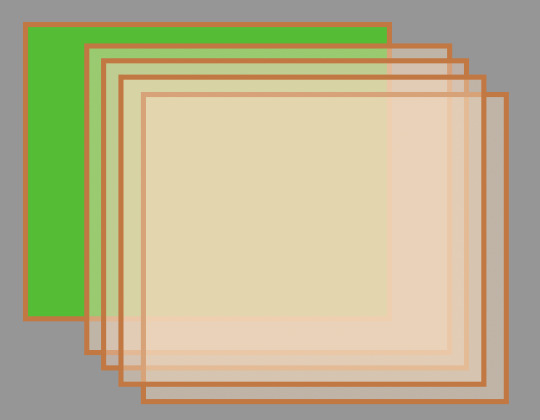
This would have the end effect of giving the skin this yellow cast vulcans have in the show via makeup. it is not green, it is not red, but something in between.
Vulcans could then have eumelanin on top of that that give us normal deep shade variations from tuvok to stonn. Because of the predominance of eumelanin, characters like tuvok would not appear as yellow as whiter vulcans.
There are other skin pigments vulcans could have that we aren't even considering. There are selenium based melanins that have higher skin uv protection, which could add even more pigments and change the color of vulcan skin even more.
Ok, but are vulcan mucus membranes and lips green?
First thing to note is human nipples and lips aren't red b/c we just have our blood just hanging out right there. We have red pigment (i.e. pheomelanin) that is making them red. (and other amounts of eumelanin just like all skin, which can end up looking purplish in certain skin tones).
Look I like a green vulcan penis fanfic as much as anyone else, but we are shown no evidence that vulcan lips, nipples, tongues, mucus membranes in general would be green. If we go by the previous section, and assume vulcans want greater sun protection, they could have large amounts of eumelanin and less translucent skin to ensure they still look reddish on the outside. But vulcan skin doesn't have green pigments in it as portrayed by the show. And it doesn't seem biologically advantageous to have green pigments just for lips/inside the mouth when all your other pigments are red based.
Ok, but maybe this is a technical limitation, maybe they just couldn't make red lips on actors without a lot of unnecessary makeup. Maybe. But in none of the cartoons are vulcans shown having green lips, and Orions *are* shown having green mucus membranes in the cartoons even when they couldn't for technical reasons make them all green in live action. if this was the intended coloring of vulcans, they would have colored them that way. But they don't.
Can they at least blush green?
Well, the first question here is: why and how do humans blush? So the way humans blush is by increasing bloodflow to their skin deep capillaries. There is suddenly a lot more red closer to the surface, so there aren't as many layers of skin to absorb the red and more of it peeks through. Humans vasodilate for a number of reasons, including shedding excess heat, any chemicals in our bloodstream that increase bloodflow, and for social signaling.
So in theory, vulcans that vasodilate would look greener. Unlike paler humans that often have complementary pheomelanin in their skin that would make them look redder than normal, vulcans wouldn't have green pigments making them look greener. The red pigments would still be there to counteract some of the green. So i don't think a vulcan would ever look as green as a tomato-red human, but if they had a reason to vasodilate their skin would darken/green with the green blood.
But do vulcans have the autonomic processes to blush when embarrassed/angry/etc? That is an interesting question. Social signaling in Vulcan would be very different. Most animals don't blush. Babies don't blush. We know also that Vulcans have much more conscious control over bodily functions than humans do. So it is possible Vulcans (specifically post-surakian) don't blush at all. Or maybe they only blush if impaired, like during pon farr.
That said, maybe there are other reasons they turn dark yellow/greenish like hyperthermia, intoxication, allergic reactions, hives, etc.
#star trek#vulcan meta#vulcans#star trek tos#star trek meta#star trek tas#star trek lower decks#star trek prodigy#star trek voyager#star trek strange new worlds#spock
106 notes
·
View notes
Text
On today's "I am SO not normal about Dead Friend Forever": Discussing Catholicism and Colonization in this gay Thai slasher series
Some background on me: I am from a Latine Catholic family. Raised as a non-practicing Catholic (we didn't go to church or pray). Then my parents enrolled me in a Catholic school that I attended from 5th grade to the end of 7th grade. Today, I am not Catholic and have never really considered myself as such.
Ok, so in the flashback episodes of DFF, I have been noticing a lot of things. My findings under the cut.
Let's start with this crucifix and photo of the Virgin Mary and a baby Jesus.
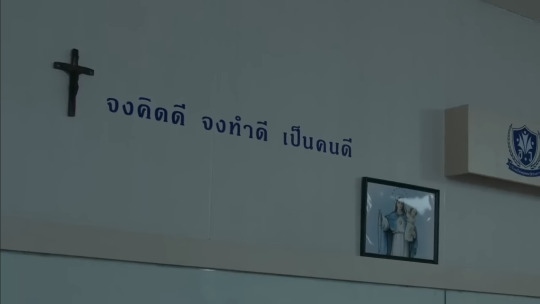
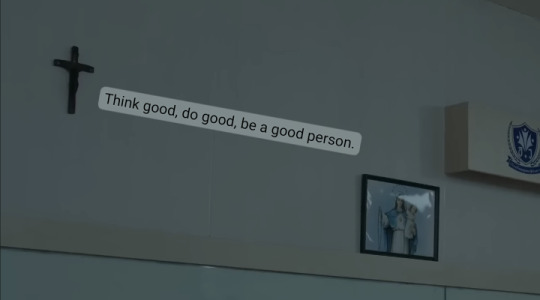
Screenshot from ep. 5.
The camera lingers here a bit so we're obviously meant to pay attention to the phrase. I put the screenshot through Google translate's image translator and the translation it gave me was, "Think good, do good, be a good person." I didn't think much of it when I first watched the episode other than it was supposed to establish that the boys attend a Christian or Catholic school.
But then there was this image posted on Be On Cloud's Instagram (also from ep. 5): X
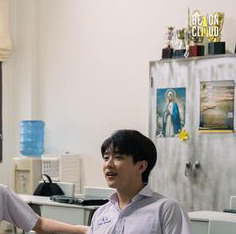
Zooming in, we can see there's another picture of Mary in the background. Watching the classroom scenes, it's easy to miss because the series itself is more washed out than the official photos posted. But this emphasis on Mary led me to believe the school is a Catholic one. So out of curiosity, I looked up the schools the writers and directors attended because I felt I was onto something here. And boy, was I!

Source: MDL
Ma-Deaw, if you didn't know, is one of the directors of Dead Friend Forever (he also directed Manner of Death and Inhuman Kiss , and lots of other things).
One Google search later (X) and I learned "Montfort College" is a Catholic school. It started out as a primary school that later added a secondary school as well.
Now let's take a closer look at some of the details of this school:
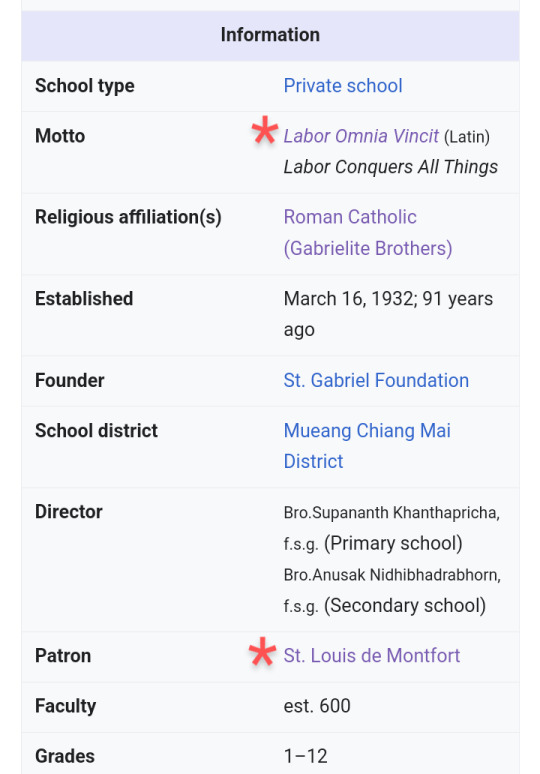
First, the school's motto "Labor Conquers All Things". This reminded me of the phone conversation Tee had with his uncle:
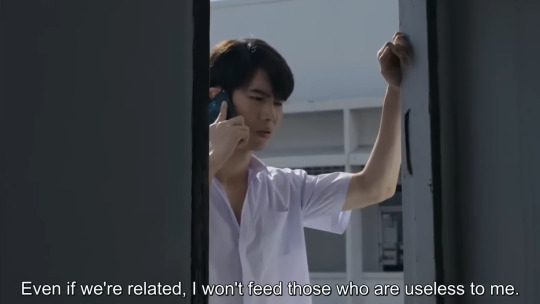
On my first watch, this sounded familiar to me but I couldn't really place why. It wasn't until I saw this other Tumblr post (X) that pointed out it's similar to a bible quote from the New Testament. The quote varies a bit depending on which version of the bible you're using but it's along the lines of, "He who does not work, neither shall he eat".
This is meant to discourage "laziness". Nevermind the fact that people deserve to eat simply because we get hungry and need food to survive. The idea that we only "deserve" things based on productivity is an extremely colonial one. — Reminder also that Tee is being forced into this "work" in the first place. He's just a high school kid. I don't need to like his character to understand how fucked up his situation is.
Then there's the patron of the school. St. Louis de Montfort was a French Catholic priest most known for his study in Mariology. What is Mariology (X)? The study of Mary, the mother of Jesus. I didn't know that was a thing but it's unsurprising considering how prominent images of Mary were in my own religious upbringing. And she's what started me down this rabbit hole in the first place. Mary is a big deal to the Catholics. I'm going to be paying even more attention now if more Mary imagery pops up.
The Garden of Eden and Original Sin
Now I want to draw attention to these images:
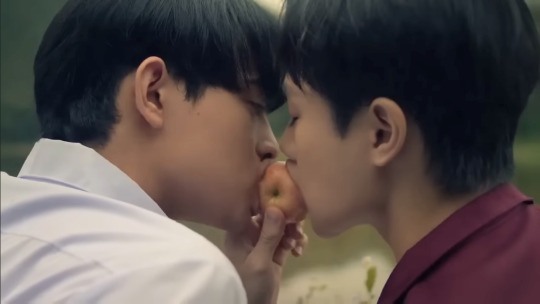
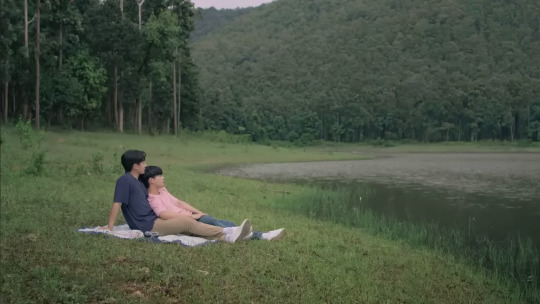
Screenshots from ep. 7
Here we have Non and Phee biting into an apple as they leisure around this lush green field. We know they've visited this location more than once because they're wearing different outfits in the screenshots. And I think it's important to note that it's Phee holding the apple and offering it to Non.
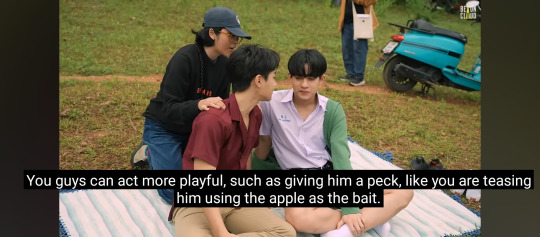
The use of the word "bait" in the bts of ep. 7 is quite interesting too. (X)
The Garden of Eden was the paradise in which Adam and Eve resided. In this garden, there were many trees to eat from. The one tree Adam and Eve were forbidden by God to eat from was the Tree of Knowledge. A serpent (Satan), first tempted Eve into taking from the tree to eat it's fruit. And then Eve gave the fruit to Adam. That is Original Sin. And because Adam and Eve ate from the Tree of Knowledge, all humans thereafter are born sinful and bad, and can only find salvation through God.
Of course in the scene between Phee and Non, the sin the apple represents is being gay. And it's after this, and after the bracelet scene, that Non becomes involved with Por's film and his tragedy begins.
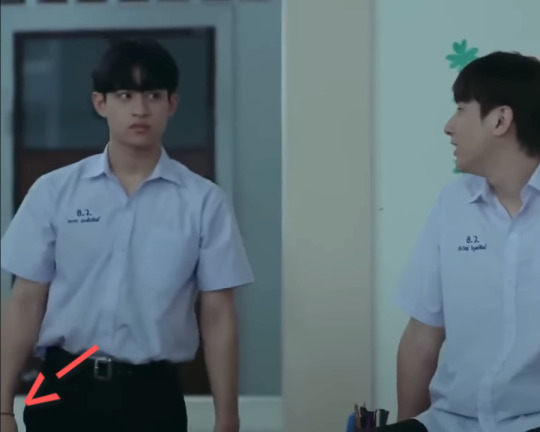
Zoomed in screenshot from ep. 5
And I wonder if the bracelet scene is the last time Phee and Non visit this forest location. It would parallel how Adam and Eve were cast out of the Garden of Eden once they sinned.
Final Thoughts
You give me a story that criticizes Western religion and how it's used as a tool for oppression and colonization, and I'm gonna eat that shit up. I am gonna eat it up. Every. Single. Time.
I really wasn't expecting anything like this from Dead Friend Forever. This level in attention to detail is unmatched. I don't think I've watched a more well planned out show. And no matter where DFF goes from here, these seven episodes will always hold a special place in my heart. 💗
#dead friend forever#dff the series#pheenon#barcode tinnasit#ta nannakun#dff meta#dff spoilers#tabarcode#dff*#*#i just love it here#this is my comfort show idc
190 notes
·
View notes
Text
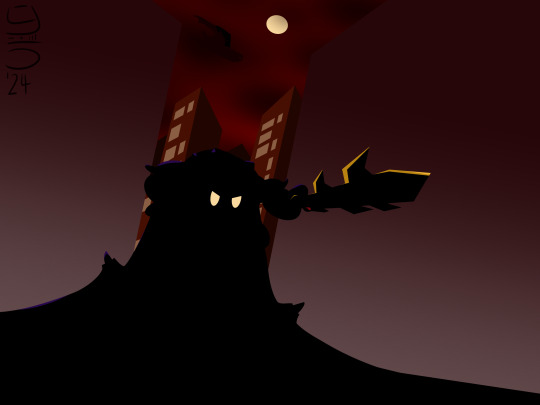
The Masked Crusader
"GOTHAM CITY'S CORRUPT LIFESTYLE WILL END! I WILL RULE!"
"I AM VENGEANCE! I AM THE NIGHT! I. AM. META KNIGHT!"
(bonus: "behind the shadows" version)
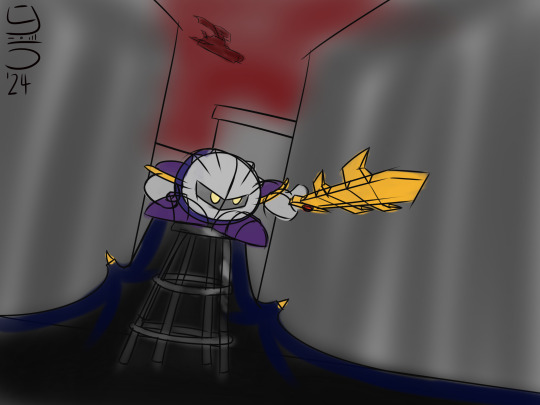
#the masked crusader#fanart#crossovers#crossover#kirby series#kirby#kirby fanart#meta knight#halberd#halberd battleship#galaxia#dc comics#batman#the caped crusader#batman the animated series#batman tas#gotham city#silhouette#silhouette art#alternative version#behind the shadows#behind the scenes#wip#work in progress#wip art#sketches#humor#bar stools#art#artists on tumblr
73 notes
·
View notes
Text
are people aware of the fact that Mizu is not canonically in any way shape or form.............. queer....bi.....
(quick note here because reading comprehension stays dead and people may not read the tag novel: I want bi Mizu! I hc her as sapphic! I love sapphic Mizu)
#Yall are not ready for this take but.......boy.......#can we like praise the show for all its wonderfulness without Proclaiming it a REVOLUTION for the LGBT com. before it actually earns it#It's a thought.......#No one wants bi Mizu more than me trust me but it's just not canon yet. Gender exploration has not gone There#we can meta and we can HC and we can analyse. But it's SUBTEXT#But actually full on praising it for .... something that it's just not there yet is wild to me#A sapphic AF woman#I GET IT. All I write is gay Mizu &Mizu/ladies but it's not canon yet! And if we get it great if we don't oh well!#I'm just saying that...you can't praise a show for what Might happen. That's all 🧘🏻♀️💙#Blue eye samurai is wonderful for so MANY other reasons#Stop giving it credit it has not earned#this is totally open to discussion and non confrontational btw❣️#if anything the only thing you can kinda give them rep for is Taigen getting a hard on for someone he thinks is a man and STILL...#blue eye samurai#bes mizu#and before anyone comes at me swinging I don't ship ta*zu. that's not at all my point.
49 notes
·
View notes
Text
My DFF Theory:
Phee and Tan are in it together, and they are fucking with legitimately supernatural forces.
Deets under the cut:
Phee is obviously guilty over saying what he did to Non after catching him seeking comfort in the arms of a literal groomer. And we don't yet know if they spoke again after that or before whatever tragic roofie bullshit is about to happen to Non. That being said, Tan is also new to the group. He "joined them later" just like Phee, after Non had already disappeared, but has no romantic attachments (unlike White).
Personally, I think Tan may be Non's mysterious older brother, New (not all older siblings have to be taller than you, as the shortest and oldest kid in my family).

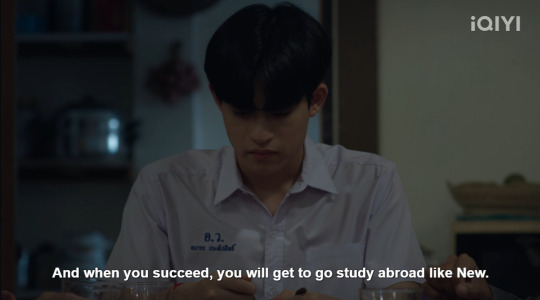
Especially since he has zero qualms asking about Non despite how squirmy and uncomfortable the others get.
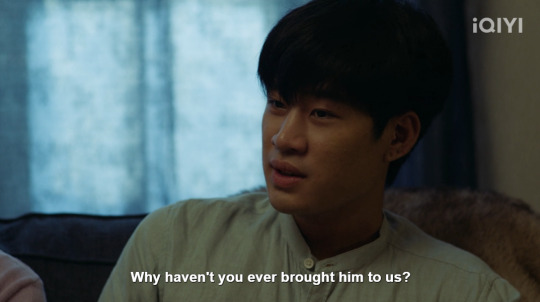
He's also in close proximity with Phee during most larger group shots.
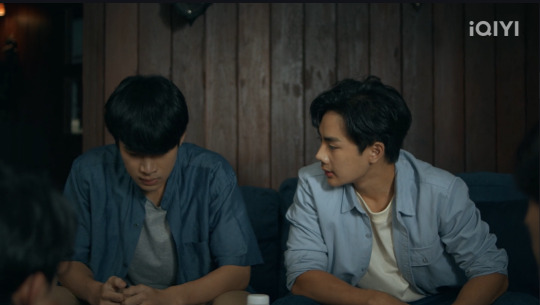
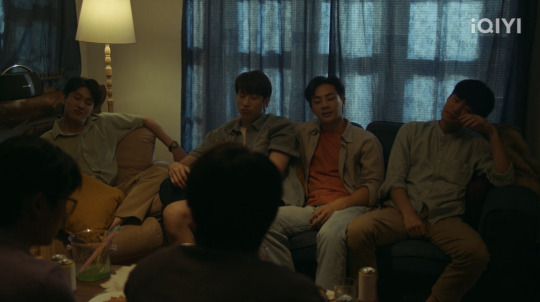
At first I thought they might've been rotating who was under the Janta mask/taking turns harassing the group at large or doing their spooky window peeping. But after the bathroom incidents with White and Top, and the rate at which Janta appears/disappears in the woods, I think they may have actually sacrificed Keng in exchange for supernatural help.
I'm not going to go on a tangent about how "Phi" is also the casual term for 'ghost' in Thai folklore, but it's a detail to keep in mind.
Mophi folk priests are also said to work "using trances, sacred objects imbued with supernatural power (or saksit), possessions, and rituals". What's the best way to get your group's most annoying and shitty guy to dress up as the killer and take Por out for good? Or to convince someone that a nearly-dead guy just jumped off the couch and tried to kill them? Trances, baybee!
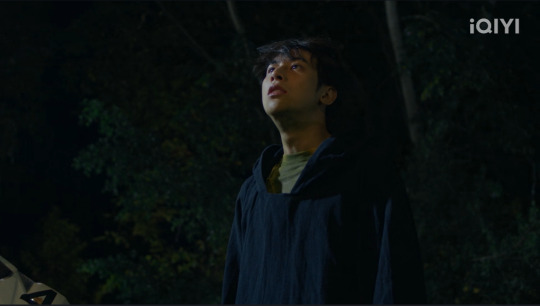
(the Janta costume and setting may also be soft references to Apichatpong Weerasethakul's "Uncle Boonmee Who Can Remember His Past Lives" but I can't say for certain since it's just a passing similarity)
Now you may be asking, "Well what about Phee and Jin?! Phee protects him in the faux-cemetery even though he's a certified weenie nibbler!" Or even, "Hey! Tan and Tee are in the woods together when they see the monster and both of them are scared!"
And my answer is: No duh! You don't want to give away the act by not freaking out when you see the creepy masked figure in the woods. And you certainly don't want to be the only guy who hasn't been harassed. Those would be the two biggest red flags!
Plus, how else are you going to make sure that the guy who posted revenge porn of your boo being groomed on Twitter gets what he deserves? Being at his side and offering comfort only to rip it away at the last second??? Priceless. And well fucking deserved imho.
So yeah, that's my theory so far. Thoughts?
#dead friend forever#dff meta#dead friend forever meta#dff the series#barcode tinnasit#ta nannakun#jj chalach#copper phuriwat#jet jetsadakorn#us nititorn
66 notes
·
View notes
Text
Okay I maybe a little slow on the uptake but I think this is BOC's way of soft launching TaBarcode. Think about it: Jeff is gone, leaving Barcode pair-less. Ta never had a pair. They have been with BOC since the beginning thus a greater chance that they are comfortable with each other. They were the only two people of the same age in KP during shooting and then during the tour so that's gotta have made them more comfortable with each other. Them being from the get go also means they have a greater chance of being 'rewarded' by being made into a brand pair. (Branded pairs get better sponsorship deals.) This is BOC testing the waters, waiting for Wuju Bakery, which mind you was supposed to have released before DFF. So they are waiting for Wuju Bakery to come out and after that they can announce TaCode as a pair.
#nothing against copper#but I like TaCode better#dead friend forever#dff#meta#ta nannakun#barcode tinnasit#tacode#tabarcode#kinnporsche#wuju bakery
60 notes
·
View notes
Text
"how to reconcile Chu Wanning's cooking skills vs Mo Ran's love of The Wontons", a Guide:
(NOTE: I have only read the first two official English translated volumes, and scoured the internet for spoilers-- if there's later canon confirmation of something that I haven't encountered yet, I don't know her)
Chu Wanning is shown cooking things badly (such as the cabbage and tofu stew), and cooking specific things very well (the wontons). He is also implied to have cooked other things at least tolerably well as Chu Fei. Evidence:
The wontons are described thusly, with the implication that they're just as good every time Mo Ran has had them:
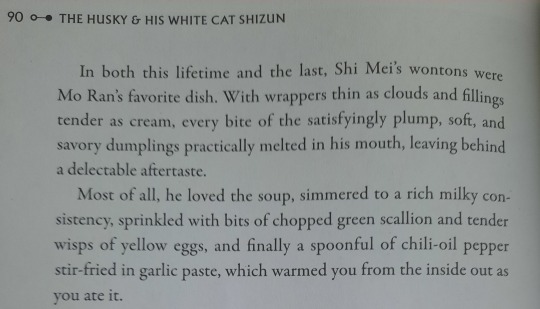
Conclusion? Chu Wanning can cook at least this one thing consistently, and Mo Ran loves it every time. As far as we know Mo Ran is the only one who's ever eaten them, so him loving them is not actually an endorsement that they ARE good-- just that HE thinks they are.
When he's going to make the cabbage and tofu stew, this is Chu Wanning's response to being asked if he even knows how to cook:

Conclusion? Chu Wanning is at least not confident enough in his cooking abilities to claim proficiency. I would be tempted to chalk this up to "he's so skilled at other things and so critical of himself that he's downplaying his cooking skills" except he absolutely flubs the recipe so badly that it's unrecognizable, and everyone who eats it gets sick.
When Mo Ran is half asleep, and believes himself to still be in his previous life with Chu Fei, he says this:

Conclusion? Chu Fei frequently cooked non-wonton food for Taxian-jun, which Taxian-jun enjoyed enough to request more of it.
I've compiled options of what this all might mean when put together:
Probably authorial intent: Chu Wanning isn't a BAD cook he's just a SLOW and METHODICAL cook, and that does not lend itself to batch cooking like he was expected to do in Mengpo Hall.
POSSIBLY authorial intent: Chu Wanning is a REALLY GOOD cook when he knows a recipe, but had never made the cabbage and tofu stew before and had no real instructions, so he fucked it up and got an unfair reputation for being a bad cook. This is a loose parallel to how he is broadly misunderstood as a person.
Sappy/sad option: the wontons are fine but the fact that they were made FOR MO RAN makes them special to Mo Ran. He's associated them with feeling good, and because he thought they were from Shi Mei, his happy memories of them weren't warped or stolen by the flower, leaving them as his favorite memory of food. They're untainted by hatred, and therefore they are the best.
Funny option (not supported by canon): Mo Ran just has bad taste.
Funniest option (not technically UNsupported by canon >_>): Chu Wanning is a bad cook, and frequently hurts himself while cooking. Unbeknownst to Mo Ran, the flower's bloodlust can literally be sated with literal blood. Mo Ran's memories of the wontons are his least tormented by the flower, because while eating them he's consuming Chu Wanning's actual blood, so the flower is sated and pleased. They taste the best to Mo Ran because their secret accidental ingredient (blood) overwrites their actual mediocre flavor.
My favorite option: The reason the wontons are the best food Mo Ran has ever eaten is because they're literally just... all of Mo Ran's favorite foods combined into one dish. Chu Wanning isn't a good COOK so much as he's an encyclopedia of knowledge about Mo Ran. The wontons are perfect because they're perfect for Mo Ran specifically.
#erha#2ha#erha he ta de bai mao shizun#erha spoilers#the wontons#ranwan#chu wanning#cwn#mo weiyu#mo ran#mwy#erha meta#2ha meta
118 notes
·
View notes
Text
Dead Friend Forever: I managed to catch up in time to watch the finale, and here are my immediate, uneducated, "holy shit" thoughts
First off: I acknowledge I am an utter interloper on this tag, having written exactly zero meta words about this mostly great show. Second: everything I know about slashers comes from my childhood memories of "Scream," and my recent conversations with the lovelies @lurkingshan and @neuroticbookworm. So I'm not an expert here. Thirdly! I was inspired in part by them to watch this, and also by the friendies who jumped into comments on my recent KinnPorsche liveblog watches for my Old GMMTV Challenge project. I've been waiting these past few weeks to finish Dead Friend Forever before putting pen to paper on my KP rewatch thoughts, because I thought Be On Cloud did something fabulously experimental with DFF as its second major serial drama.
Anyway: all of this is to say that now that DFF is over, in the near future, I'm gonna write a bunch on KP and a bit more on DFF -- but I want to offer just some quick wandering thoughts on DFF now.
I think like many of y'all, I found the tone of the last PheeJin moments to be discordant with the tenor of the rest of the finale episode. The way I'm calculating this, as I'm sure many of you are, is that I think there was a commentary on fate and Buddhist purgatory, particularly with New/Tan being able to hear from a thankful Non one more time before New's passing. New suffers, it seems to me, the least painful death, and I think that was in part Non’s doing.
In order to conclude the tone on PheeJin, I do wish that we would have seen a flashback back to PheeJin at the house. I guess we’d assume that Phee and Jin never regained their consciousness, that the antidote didn’t work, and that their cyclical fate would be returning back to the lakeshore, only to be haunted by Non again. While it seems to me that Tee, in whatever realm of fate they ended up in, got his appropriate ending — I don’t think that the PheeJin cyclical ending at the lakeshore assigned enough “blame” of fate to either of them, especially Jin. I know @lurkingshan notes that that’s a nod to the need to appease any hopes of surviving ships, and I agree with that assessment. But also — god, BLEH, they sucked, we were left with PheeJin?! JIN??? My boy White, my bubbala, he’s the good one that got really in-your-face off-ed? Wah. (But I do see and understand why White needed to die, to make Tee’s residual fate the utter living hell he deserves.)
Like I said: on a more macro note, I’m gonna have thoughts about DFF, Be On Cloud, and KP in the coming days, because I just like that BOC is dabbling with some experimental writing while allowing solid acting to really shine. (And I compare that to what’s happening at Idol Factory and the recent writing miss that was The Sign.) I wish the ending wasn’t as milquetoast as it was, but BOC still traffics in BLs, and I guess they felt they needed to throw the fans some kind of BL bone (huh huh).
But overall? I am REALLY GLAD I watched this, and it absolutely belongs on the OGMMTVC syllabus. This was incredibly new for the Thai BL genre, and I gotta give BOC — AND ESPECIALLY BARCODE AND TA, WOW — their flowers for taking Thai BL into this new direction. For the most part of this run, I had a great time with this show, as brutal as the content was.
#dead friend forever#dead friend forever meta#dead friend forever the series#dff the series#barcode tinnasit#ta nannakun#sammon
44 notes
·
View notes
Note
CHAT LUZTOYE PLEASE
HELL YES! i'm SO sorry it took me a forever to get to this <3
so i have a web weave floating around here somewhere that has this as a part of it because well. it's Me. but LOOK at this shit okay

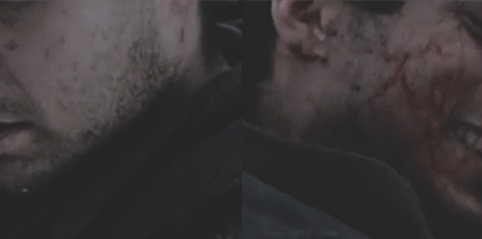
i mean i'm. i'm just. oh my god-
firstly, y'all would not Believe what i sacrificed to get these screenshots and cropping Just Right. literally my sanity is gone. but it's worth it because this gives me Thoughts and now i will express them!
the PARALLELS with this are so Ripe with opportunity for me PERSONALLY because these two scenes seem like the antithesis of each other, in every way. the start of a journey versus the end of one. BUT they hold the same exact light in two Very Important regards.
first off, both the 'just get me a drink' scene and the Fucking Devastating scene both are the End. different in every way; warm v cold, close together v far apart, everything is so so different and everything is absolutely the same: cold and white. the only thing that ever stays the same is that everything changes.
with the first scene and luztoye, for me it's mostly about what's ahead. there's a reason that it's THEE headcanon, okay, and that's because it has so much opportunity. anything can be between these two, anything can happen, anything can have already happened.
and the second thing? the opposite and the same exact thing.
the whole Part of The Breaking Point is that everything is a standstill. everyone is dying, and everything is cold, and nothing ever changes and everything is different in the blink of an eye. this IS the end of the line for luztoye. it's over.
BUT it's the same to the scene in episode one in one important regard.
it's the beginning of something else.
because this is where, to me, at least, the Magic of luztoye is. what happens After. it's about the story, sure, but the destination is always a factor.
i have written roughly 192,456 words of post-war luztoye at this time (*typing from straight jacket*), and it's the most fascinating thing.
how do these two interact After the war, in juxtapose to how they did Before? everything is so different; so much has changed from the first photos to the second. what's the end of it. what's the After.
i hope this makes sense! i feel like it doesn't, but that is very on par for my entire life <3. i just have. feelings. many of them.
anyways. if you have made it to the end of this, congratulations!! have some grainy Hand screenshots as a prize <3

#rie answers#kirk acevedo drop jawline routine NOW. ridiculous#seriously THANK U for the ask i am. just very slow#but i love love love admiring them. and Thinking and Plotting#now. back to the cheerleader mines. this will make sense to Two mutuals#luztoye#george luz#joseph toye#joe toye#band of brothers#also is this meta? i feel like it's too ridiculous to be meta. is there a half meta??? this is just ta
42 notes
·
View notes
Note
Some of the posts you've reblogged lately have clarified some of my thinking about how Gaiman has reworked the characters from the original text. In the novel, Aziraphale and Crowley have at base the /same/ flaw: they evade thinking about the ramifications of their actions by displacing everything onto their "job" requirements. To which the novel says, no can do. Aziraphale has his moral epiphany at the airfield before Crowley does, but it is by and large the same epiphany. Most of the rhetoric about offloading responsibility goes to Crowley, either directly or in free indirect discourse, but he's also the dominant viewpoint character of the two. For that matter, we are told how Crowley /feels/ about where Aziraphale has led him, morally speaking, but we aren't privy to Aziraphale's interiority during this moment. In a sense, though, that doesn't matter, because there's no reason to believe that the sense of liberation is any different.
In the series, though, Gaiman ramps up the tension in S1 and S2 by splitting up their problems. Crowley still has the "but it's not my FAULT" moral flaw, considerably amplified with even more suspiciously unreliable narration, and he still thinks about his work for "head office" as just that, a job. But Gaiman rewrites Aziraphale so that, as other people have pointed out, he thinks about being an angel as an identity (and being a demon, for that matter). I think you can make a good case that unlike in the novel, in the series neither character fully grasps how the other conceptualizes himself. This is one of the reasons that the novel's moral epiphany doesn't happen in S1, and can't happen in the same way in S3. Crowley nudges Aziraphale as though he were nudging him out of a job, not as though he's nudging him into an entirely different sense of personhood. Aziraphale praises Crowley's goodness because he essentializes it, seeing it as a sign that Crowley's demonself is continuous with his former angelself ("you were an angel once"). In S2e1, we have the very telling dialogue in the coffee shop where Crowley knows all of Aziraphale's "voices," but doesn't understand why it ought to set off fire alarms for him that Aziraphale so needs to report to him for praise. This sits alongside the tension in the Job minisode, in which Crowley is openly disaffected with both Heaven and Hell, but doesn't see the situation in the same existential terms as Aziraphale does. The end result is the S2e6 car crash, in which each character proposes to the other in a way that solves their /own/problem.
LWA i’m guessing that this is you - let’s face it, noone else sends me asks like this - but by some chance that it isn’t, congratulations anon you sound just like them (and now i’m slightly terrified that there might be two of you lurking around my blog).
also - apologies that it took such a long while to come back to you; my original response was approaching half a dozen pages just for aziraphale alone (and i wasn’t done by a long shot), and then i remembered to great disappointment that tumblr isn’t exactly the forum for such a long post (future rhi: haha you played yourself, this is still a mammoth response). at which point, i basically had to rewrite it all over again, condensing it (future rhi: you failed) down into what i’m hoping are my key points. i wish i was joking when i say that you’re currently reading what is probably the fourth or fifth version of this response.
i think where a lot of disconnect happens in how we view aziraphale’s journey throughout both seasons stems from thinking that the concept of being an angel is all-encompassing, instead of potentially also being multiple layers that aziraphale has steadily been shedding throughout the story. personally, i think there are three distinct areas around aziraphale’s identity as an angel; heaven, god, and being good. a lot of these overlap and intertwine with each other, for sure, but i think it's too much to ask of aziraphale, as the audience (and crowley), to be able to abandon it altogether in one fell swoop. being an angel is not the whole of what aziraphale is - this much is evident - but to his mind, it's the core. dismantling that, stepping away from that, and finding who he is might be without the overarching expectation and pressure of being an angel is no doubt terrifying... and potentially we're not giving that struggle enough credit.
to my mind, he disconnects from heaven fairly early on in the narrative, as far back as job, and continues through the ages with a sense of fear - or, at best, trepidation - from them. however, this tenuous allegiance carries through to s1 when it severs entirely with the call to the metatron; i truly do not see any instance after this point chronologically where aziraphale has any fondness or loyalty to heaven as the institution, nor the archangels. he is unique in being an angel that has experienced the fullness of earth and humanity, and this has influenced him fundamentally into being an angel that is so 'other' from his peers that he's by default unrecognisable, almost alien, and is deprecated and dismissed as a result. it's the very first modern scene we see of him in s1 - putting him in direct contrast with gabriel (arguably The angel of abrahamic religion; the one that nearly everyone recognises, and considers to be the epitome of What An Angel Should Be). crowley has similarly influenced him through the ages; he's made aziraphale think outside of the dogma that heaven instils as being the irreproachable, righteous, Good Side - as well as encourage him in his hedonism and self-interest (literally the reason why they both endeavour to stop the apocalypse in the first place) because it is important to aziraphale personally, and he takes pleasure and happiness from it. aziraphale "[keeps] up appearances" for the sake of complying with heaven and not raising suspicion, but is ultimately "an angel who goes along with heaven as far as he can".
aziraphale's relationship with god is little more complicated, but again - i think aziraphale reaches the stage where he is shown time and time again that god chooses to be distant, and not to act or intervene*, which is something aziraphale cannot fully reconcile. as he sees it, hell does bad things (as does heaven, as is demonstrated with the apocalypse), and where you have the power to stop it, you should. equally, if you have the power to do something good, you should do it. he takes literal issue with this in job, where he learns that god is resolutely refusing to intervene in whatever hell is cooking up for job and his family, and he instead chooses to defy this and go to crawly to beseech him to not hurt them (obviously not realising that crawly has reached that page already). he holds out hope that god will do the right thing, but the storm comes from hell, starts early even, and god does not stop it - would not have stopped it, even if the children were above, and not in the cellar.
he cannot reach any other conclusion than crawly must be right, and god in fact wants the children to die. when it comes to the lie, and aziraphale resigning himself to falling for it, i do wonder how he reconciles this after he doesn't fall - my thought currently is that aziraphale believes that god has seen his 'transgression', and chosen clemency - to forgive it - but aziraphale fears she may not do so again. it makes sense that aziraphale then is so resistant to the Arrangement later on, and then why he appears so set on not helping thwart the apocalypse because that would be going against the plan (despite, yk, evidently agreeing with crowley and privately wanting to stop it as much as crowley does). this is once again shattered by the call to the metatron; aziraphale holds out hope that the almighty will fix everything, surely this is the time where they would intervene, job and his family is one thing, but destroy the entirety of their creation? but... god won't even get on the call with him. that to me is, once again, where aziraphale lets go that particular strand of what makes him an angel - as far as i can recall, we see no instances in 2023 where aziraphale declares any outright loyalty to god or to heaven*, even going so far as to initially reject heaven (and god, presumably, by extension) - "i don't believe there's anything left to be said, i've made my position quite clear" - until he is given the opportunity to... fix it? improve it? mend it? restore it? semantics, but "make a difference" plainly recognises that how it currently exists, or how it currently functions, is wrong.
*although, ultimately, this is arguably the only moral solution for god as far as humanity is concerned. an omnipotent and omniscient being should not get involved, nor even a vaguely powerful one (i'll take "free will" for 500, alex).
*i've said it before and i'll say it again; where aziraphale says "but heaven! it's the side of truth, of light, of good", this to me is not aziraphale saying that heaven is itself good. that would be in direct conflict with his willingness to "make a difference". if he thought heaven was perfect as it is, 'making a difference' wouldn't even come into it. to that end, he knows it isn't - and instead i see it that aziraphale thinks these are the qualities that heaven stands for, what it ought to be... not what it currently is.
last thing on god: aziraphale even literally steps into god's shoes in ep5, during the ball - it's all very well, admirable even, that he hosts and crafts the ball to be a curated environment where maggie and nina might realise that they have fallen in love with each other, he thinks he's doing the right thing by intervening... by getting involved. but as you say, the book epiphany hasn't happened for them at the end of s1, not even in s2, and aziraphale hasn't learn the lesson of why "messin' about" might actually be the wrong thing to do. in fucking about with the ball, he completely tampers with the free will of not only the girls, but everyone else. nina reflects this back at him, and it visibly unnerves him that she does so; he is removing free will from all present (or, attempting to in nina's case), but is doing what he considers to be right and ergo what he thinks god should do (in his eyes). he doesn't reach the free will realisation, at least not as far as is evident to the audience, and it is clear that when the issues surrounding playing god are highlighted to him (by both nina and crowley), he chooses to dismiss it. he is doing what he thinks is right, but in doing so is literally demonstrating the shortcomings he has in his faith in god.
but aziraphale and the concept of goodness? ah. this, to me, is still the key part of his identity that he is struggling to let go of. aziraphale by the point of s2 accepts that he is not perfect. the first meaningful scene we see of aziraphale in the post-s1 timeline is his interaction with maggie; he forgives the rent, does a kind and compassionate thing, but very readily recognises that he did it for his own self-interested motivations and prioritising himself first (so far as to look uncomfortable when thanked for it by maggie, and referred to as an “angel” as a result - aziraphale knows that his motivation was not angelic at all). a ‘younger’ aziraphale, i do not think, would have so openly admitted to this, and instead would have laboured it as a purely selfless, kind, and benevolent thing on his part... and it would have taken crowley probing further to get it out of him that he did it out of self-interest. this doesn’t preclude that aziraphale was being kind to maggie - kindness is in the perception, not the intention (imo) - but he accepts his shortcomings as far as being an angel is concerned, and the freedom of breaking away from heaven grants him the freedom to do so. but contrast this with his taking-in of gabriel. aziraphale is not stupid, and is evidently frightened, anxious, and suspicious of him turning up at the bookshop, but what becomes clear to him is that this is genuinely someone under threat, in trouble, and lost; yes, he gets frustrated with the situation, but he offers gabriel/jim sanctuary, and is set in this decision before crowley even enters the picture. he makes the clear assessment that the wanker-that-is-gabriel is not the being sat before him, and instead chooses the route of kindness.
aziraphale is not always a good person, and there are multiple instances where this is proven, but there are equally just as many instances that show that he is - and i think he accepts that he is someone that is a mixture of both. that being said, this is still something that he is self-conscious about (if shax's jibes at him in ep6 is anything to go by), but it stems more from a place of aziraphale feeling that he is not enough for heaven, or for god - that even, perhaps, he doesn't deserve to be an angel; i don't think it's out of place to say you can accept the traits that make it so you do not fit in (and in fact be glad that you do not), and yet still feel ashamed and anguished that you have been rejected for the same. there is a case to be made that this in part may be why he accepts the metatron's offer to return to heaven and run it - that it's an offer from the voice of god himself, in acceptance of who aziraphale currently is - but i do wonder how far aziraphale believes this.
now is finally time to start bridging the gap to crowley, because it is clear that being good is paramount to aziraphale. however, the issue is that the sense of being good is paramount, and he still conflates it with what is right. crowley is not to blame for this, but he is undoubtedly a guiding principle in how aziraphale develops this sense; crowley constantly challenges aziraphale on his rigid, often deontological mindset of "the action must be good for it to be the right thing", and instead makes him consider the wider, consequentialist picture; that sometimes, "the action might be a bad thing, but if it results in a good thing, that is the right thing". he reaches, therefore, the conclusion that if crowley ends up doing the right thing, he therefore must be good - and ignores all of the events, all of crowley's behaviour, that point to the contrary. hell, he even ignores all of crowley's own protestations to the contrary. as you say, aziraphale essentialises it.
maybe aziraphale does think that crowley is, at his core, the same person he was as an angel, but... personally, idk how far i currently interpret this to be the case (my thoughts are more along the lines of 'crowley is, regardless of being an angel or a demon, a good person, and that's what counts', but maybe i'm optimistically giving aziraphale more credit than is due). in any case, upon reflection, aziraphale has not learnt from the 'shades of grey' argument... not in relation to crowley. sure, i think aziraphale accepts that he himself is a light shade of grey, but crowley? i don't think he fully comprehends that that same school of thought must apply to crowley too - crowley is not a wholly good person, but arguably is an often dark one who sometimes chooses to do good things/knows when not to cross the line - and therefore lands on the expectation that crowley would return to heaven with him to do good - because that's the right thing for a good person to do. aziraphale has turned to crowley, and holds him to the same ideal to which he previously held in heaven, and arguably in god. these are entities that aziraphale thinks ought to stand, and perhaps originally stood, for "truth, light, and good", and when that went down the shitter in reality, aziraphale has turned to his own reality and found crowley instead. the faith - and comfort that it brings - had to go somewhere. that is not a responsibility crowley should shoulder, under any circumstance, but in not recognising that aziraphale is doing it, aziraphale hasn't been dissuaded from it either.
but hey, let's finally discuss crowley (and if you're still reading... incredible). look, i've made no secret of my... criticism? of crowley, and to reiterate not only what you said in your ask, but also what we've discussed at length; crowley is not a reliable narrator. this, regrettably, makes me reconsider accepting what are posed as core principles of crowley's character. he does not give a consistent account of the fall; whilst what he does say may be, at best, piecemeal snapshots of the events that led to his fall and, at worst, be completely false altogether, the conclusion is the same - there is something missing, and i'd wager that it is something that he doesn't want to admit, confront, and/or reconcile with. add this to his reluctance, or outright refusal, to accept accountability for his actions on a number of occasions, as well as his tendency to skirt around or fudge the truth, and i naturally do not default to taking his word as gospel; that's not to say that i think he has a nefarious, hidden agenda hiding away (obviously not), or is an entirely reprehensible character, but from an audience perspective i think if we're to anticipate some Major Revelations in s3, this is a key place to start.
one quote, from s1, that sticks out to me is, "crowley was all in favour of armageddon in general terms, but it was one thing to bring it about, and another for it to actually happen." this literally is the summary, for me, of all of crowley's ouroboros/boomerang/"this will no doubt come back around to bite me on the ass" characterisation. if i (contrivedly) rephrase this, it reads to me as 'i'm not that bothered about the end of the world and humanity in theory, and happy to add in bits and pieces that would make it happen, but i will have an issue as soon as we start gearing up to press the big red button'. as such, i think we have to contend with the fact that crowley may not be as moral as has been widely accepted. maybe i'm assuming too much, but if you were truly of moral standing, presumably even the notion of setting out plans to destroy the earth would be a big no-no, if you are in fact against the apocalyse because it would mean the destruction of humanity. but of course, this would presume that crowley has any way in which he can viably refuse (which, he doesn't) - to which end, therein lies the dichotomy of the nuremberg argument. is it an immoral action when you don't have the room to consider the moral option? regardless, does that absolve you of consequence?
this would also, presumably, be at odds with AWCW's objections to armageddon as put to us in the pre-fall scene, right? so, to me, the conclusion i reach is this; first, that AWCW obviously does not want the stars, the universe, to disintegrate as a mere bookmark in the wider 'great plan', but this does not come from an altruistic viewpoint; it comes from a more selfish one. and that's totally fair - i probably too would have issues with spending my entire (and at this time, 'entire' is unquantified) existence building and creating, only to see all of my work go down the drain as if it's nothing. but - i do not see it as him having any ulterior, selfless consideration for humanity. second, crowley likes earth, but for the convenient and clever things that exists because of - and in concurrence with - humanity. the reasoning he gives to aziraphale for stopping the apocalypse is just as true for him as it is for aziraphale. there is the line of "you said you would be testing them, but you shouldn't test them to destruction...", an echo of his sentiment at the flood, that gives weight to crowley privately wanting to stop armageddon for humanity's sake. i agree with this assessment on the whole; that crowley holds it as an equally strong and valid reason for thwarting it. but i think it is also fair to at least suggest that this reasoning may also stem from crowley's own personal feelings about the fall - a group of angels that were, presumably, tested to the point of their own destruction - and how god, in his eyes, perhaps should have learnt from that event before planning to do the same to her Ultimate Creation. this, for me, is a little more in line with his characterisation as has been presented so far.
but then again, crawly seems to be acting selflessly in the job minisode. i, once again, am largely inclined to agree... but for the sake of exploration, i do wonder how far it's entirely selfless, or altruistic, and instead how far it's a projection of thwarting god in the sense of rectifying his own punishment. a case of 'i went through this and it's shit, humanity doesn't deserve the same thing the same thing to happen to them', vs. 'i went through this and it's shit, and now she's up to the same old bollocks because she's awful, so im going to thwart it as a big fuck you to god'. maybe there is no real distinction, or maybe it's a bit of both at the same time, but the former would more strongly suggest to me that, looking at the parallel between job and the fall, crowley was the entirely innocent party in his fall just as humanity is/was, which i don't personally buy. 1827 and preventing elspeth's suicide is a little closer to the mark where selflessness is concerned; "you have sinned very bigly - trying to kill yourself?! it's not on!" strikes me that crowley is now acting out of the interest of keeping elspeth out of hell, where it is pretty clear Bad Things occur. there are other clear instances of good too* - he gets the humans out of bookshop in ep5 and brings back mr brown from hell, he treats jim with kindness once he establishes for his own peace of mind that he's not a threat, and he protects maggie from being accosted by demons (and this is not to mention how he, on the whole, treats aziraphale). suffice to say, crowley is clearly capable of selflessness, and doing both the good and right thing, but i do think that he doesn't necessarily act with selflessness and goodness as his default motivation. there are enough instances to suggest that he isn't a completely moral character.
*now that im thinking about it, it seems that it's largely when the threat of hell specifically looms that crowley is at his most selfless..? hmm.
crowley does centre around the thinking that being an angel/demon as like a job - and tbf to him, it's not an overly out-there conclusion to arrive at. heaven and hell are presented as corporations and they're referred to as "head office", he is given a workload and told to report back, he stretches the truth about what work he is personally responsible for in those reports, and crowley describes himself as a 'former demon' (as if he ever stopped being one - even as a fact of being, he is a demon). so yeah - to him, it is a job. and as you say, he assumes that aziraphale sees it the exact same way which, clearly, he doesn't. crowley states that he never asked to be a demon which may well be true, but it's equally possible that he was given the option to step away from heaven and god, and took it (not knowing that becoming a demon would be the result), to my mind, it's almost like he got sacked from a start-up because he didn't like the direction the company was going and Had Things To Say/actively resisted and denounced it, and then was forced to work in a - in multiple ways - a worse work environment. it's an understatement to say that he's under no illusions that hell is awful, and he too "goes along with [them] as far as he can". however, i'm not entirely sure that we have reached where crowley has his "as far he can" moment like aziraphale has - the fact that he says to aziraphale he said no to hell, when he absolutely didn't, rings alarm bells.
as explained above, aziraphale doesn't see it in this way at all; what i think crowley finds difficult to understand is that aziraphale's experience of being an angel is very much different to crowley's. aziraphale has existed for millennia on earth as an angel, and aziraphale’s purpose and meaning is wrapped up in being an angel, in everything that it entails, and specifically being an angel that has walked amongst humanity. just as aziraphale is never fully able to empathise with crowley’s position as a demon, and all that occurred to get him there, crowley is just as unlikely to fully empathise with the importance aziraphale places on his own angelhood. in comparison to crowley's situation in being sacked from a start-up, a hypothetical fall for aziraphale would be like being sacked from a business that, whilst you may not agree with them in the majority, has provided you with a career that is the only thing you know how to do, continues to pay for your home and benefits, and without it would leave you stripped of any purpose and meaning, and no idea on what it makes you/where it leaves you without it. and even then this doesn't really scratch the surface - again, aziraphale doesn't see being an angel as being a job.
the final fifteen is where all this comes to the surface. when the two of them individually have their backs against the wall, with no discernible way out, they have very different responses. aziraphale fights, and crowley flees. heaven is a seemingly insurmountable problem that stands in the way of them being left alone (and being together). aziraphale's response is to try to change it, to fight. crowley's response is instead to flee the situation entirely. this is the same with armageddon - another seemingly insurmountable problem - where aziraphale's response is to go above everyone's heads and dial 9-9-god, and crowley's response is to flee. neither of these responses are wrong, both are completely valid, and i genuinely think it is equally possible to see the situation from their individual perspectives. but neither of them understand the other's. aziraphale, who sees crowley as a good person who will do the right thing, doesn't understand why crowley won't fight with him, won't do (as he sees it) the right thing in making heaven what it always should have been, and is instead choosing to flee. crowley, who sees aziraphale as someone who like him as quit his job and wants nothing more to do with either of their former bosses, doesn't understand why aziraphale is choosing to fight, won't prioritise them, and won't go off with him. once again, both are equally valid thought processes to have, but are borne out of being rather significantly off the mark in understanding the other, and instead thinking that the other will act in accordance to what they individually believe the other to be.
#i missed out so much in this and haven't explained my thoughts very well but i couldnt let it get any longer i simply couldn't#also LWA if you'd be so kind as to confirm this is you (or not) - just so i know if this ask needs to be added to your special hyperlink#ta very much#good omens#ask#honestly this is just All of the meta so will just simply keep it tagged to the characters:#aziraphale meta#crowley meta
40 notes
·
View notes
Text
Dead Friend Forever Is More Than Just A 90s Slasher Film Imitation
Oh man, I went in thinking I would just get a whole lot of gore and murder, and instead I'm getting a buttload of social class distinction, parental issues, mental health crises, organized crime, and a highly-likely revenge plot line.
The thing about Dead Friend Forever is that it starts unassuming, almost like an copy of all other teen slashers from the 90s. A group of friends, up in a cabin and suspects to a potential murder, become hunted one-by-one. A cliche slasher plot if I ever heard one. Until it’s not. This show is taking up a very big corner of my brain, so I’m going to delve deeper into it.
If you haven't watched episode 6 yet, spoilers up ahead.
Pulling inspiration from 90s slasher re-inventor, Scream
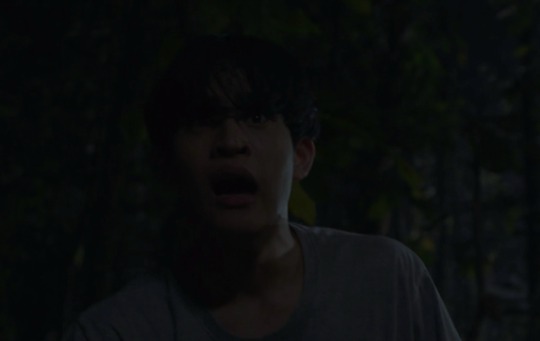

The first four episodes really set up the expectation that DFF was going to be another slasher, seemingly particularly influenced by Scream (1996). Scream was a turning point for slasher movies, signaling a shift in from the movies of the 80s to that of the 90s. It was the first of many movies to allow for the characters to be self-aware of what genre they're working in, where the characters knew of the slasher-movie tropes and attempted to do everything right to survive. Scream is also the first slasher to truly humanize the killers, and I don't mean by making them empathetic, but rather the killers were human, so they made human mistakes. Prior to Scream, the antagonists in slasher films were usually this supernatural villain that was just murder-hungry. But in Scream, the killers are all just regular people and would often make mistakes on their way to kill the protagonists, like a normal human would. It's why Scream was scary, the killer could be anyone, it wasn't this supernatural being. And even when you're making the right choices to escape, you still end up dead.
In Dead Friend Forever, we're getting so many of the same tropes that Scream had subverted. The group is working understanding exactly what they're facing; Fluke warning to not pull out the stake inside Por, Top wanting to split up in the temple while Phee, Jin and Tan veto against it expressly stating it would be like the horror movies, White not wanting to be left behind in the cabin. They all know what they shouldn't be doing while there is a killer on the loose. Also, it's why there's these funny little moments of the killer in DFF (i.e. having to steal the motorcycle to get back to the cabin). I'm not completely convinced that there isn't any paranormal activity or at least some type hallucinogen-component at play, but the way the killer acts is very human-like. Not to mention the parallel of Barcode (arguably the most popular actor in the show) getting slashed in the first minute of the show, eerily similar to how in the opening scene of Scream, Drew Barrymore (the most well-known of the cast) gets killed immediately.
The Benefits of Series Format versus Movie Format
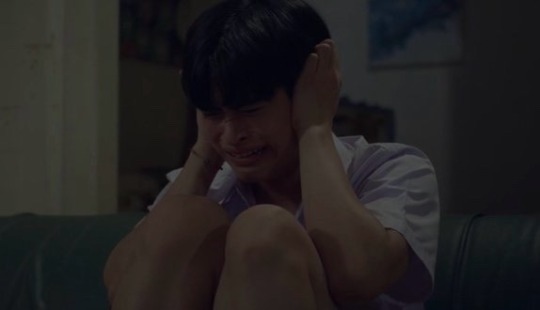


The series format is where I think Dead Friend Forever is really shining the most. @wen-kexing-apologist made an awesome post on the directorial direction this show is taking, particularly in how since the first four episodes we have very little context as to why the killings are occurring or even the state of everyone's relationship, we're freely able to form opinions on each character. Similarly, prior to getting to know what happened to Non, I also thought Tee was the better one of the group. But here we are, two episodes later and I find him to be the most detestable of the bunch (which says something, when Por and Top are competing in this category).
We're seeing and experiencing the absolute hell that this friend group had actively made (sans Jin and Fluke that suffer from the bystander effect) Non's life out to be. In a regular slasher movie, especially ones that model themselves after Scream, we find out why the Killer is doing what he's doing to the victims in the last quarter of the movie, but the emotional value is a little skewed. The little amount of time we spend learning about what the victims did to the Killer usually still leaves you feeling at least a smidge of pity for the victims and some joy that the Final Girl made it. Here, the mass consensus is that each and every one of them should die.
And it comes back to the luxury of spending several episodes in a flashback to what lead up to the killings after the game of cat-and-mouse has begun. We're introduced to Non as an outsider, where everyone, but Jin, has already formed a bad opinion of Non. They already have a brutal nickname for him (read @forkaround's awesome analysis on the term 'Greasy'). They already established that he's an outsider in the classroom, but they make an active point of only referring to him as 'Greasy' and Non just accepts it. We see the friend group frame him, causing him to spiral twice to point of suicide, proceed to prey on him into a money laundering scheme, get him caught in a criminal investigation, all while already undergoing mental health treatment. We're given that time to know and see the pain that Non is caused, the manipulation that he is put under, and ultimately the devastation that they've caused.
Dead Friends Forever is more than just another teen slasher, because it has time. And it's using its time wisely, giving us bits and pieces of information in the beginning before delving into something more sinister than the killer on the loose, the original five. Run-of-the-mill bullying has turned into framing, assault and other criminal activity, even murder. And yet, while Non is the one that has disappeared (or died), the other five have been able to make a life for themselves without suffering any of the consequences. It's showing exactly what they have done to deserve everything that is coming to them.
Final Thoughts


Man, Be on Cloud is truly blowing it out of the water with this show. I'm actually a bit sad that it's only barely starting to get the recognition that it deserves, because in my opinion, it's just that good, BUT I also understand why it's had a sleepy start. It's in an place, a BL in one sense, but not exactly a BL in any other. I've said it before, but no matter what you think of BOC as a management company, the stories that they tell are unique and they have the artists that are competent enough to deliver. Be on Cloud has, allegedly, allowed the writers take the reign on the show, even if this means messing with the couples, so even more chaos is going to occur. This is, frankly, exciting to see and experience the story as they want it to be told.
I said this when I first saw Barcode in KinnPorsche deliver that heartbreaking cry, that boy knows how to cry. He was a newbie and his stole that scene. Now this is his third show under his belt and his acting chops only continue to improve, I truly can't wait to see what more he is able to do here in Dead Friend Forever. I love that Sammon is also enjoying what Barcode has able to bring forth in Non and that all her worries have been eased. I truly think that Barcode is going to have an incredible career ahead of him, whether in music or in acting.
Ta, on the other hand, also deserves his share of accolades. I wasn't sure of how to read to Phee in the first four episodes, but with the information that episode 6 has given us? The picture has cleared significantly and now, having rewatched his scenes, everything makes sense on why he seemed to be conniving. Episode 6 had some of the strongest performances and yet the biggest gasp I made was in the last minute. The singular tear rolling down Phee's cheek after having to perform the two-finger method, to have Non throw up the pills, and holding him in his arms? Quite literally jaw-dropping.
Sammon has a strong repertoire of shows, so I have complete faith that she knows what she's doing for Dead Friend Forever. I hope this becomes as much of a cult favorite, much like Manner of Death and Triage.
Anyways if you need me, I'll probably be stuck thinking about PheeNon for the next week until episode 7 airs.
#dead friend forever#dead friend forever the series#dead friend forever meta#dff meta#dff the series#barcode tinnasit#ta nannakun#copper phuriwat#pheenon#be on cloud#pheejin#tabarcode#boc actors#thai bl#thai bl meta#bl meta#steph rambles
312 notes
·
View notes
Text
As someone who ships Imodna in various shades of both romantic and platonic....I'm really glad they didn't kiss or have some kind of romantic confession when Laudna was ressurected?
That probably sounds weird, but I think it would've gone against what we've seen from the two of these lovely ladies so far?
Not in the sense where they shouldn't be together or there isn't any set up for that...because like, look at them. That's very much there? Look at Laura at the table every week, ESPECIALLY during and after the Dusk/Yu fiasco up to now.
But...that's kinda the point? It feels like forever ago, but in game, I think Imogen has only really started to fully realize and accept that she's in love with Laudna. I think all that occurred in a week or so in game?
Obviously, Imogen knew without shadow of doubt that she cares for her. She knows that Laudna is her person and that she would kill or die for her without question...but it was only until someone came in wanting to romantically pursue her that we saw Imogen come to that realization.
They make up, Imogen gives her a ring, and then: Laudna confides in her.
She gives her a peak into her brain, into how she feels about romance and romantic pursuits.
The overall message is that she isn't ready, hasn't thought about it, and on some level doesn't think that's something she can or deserves to have for herself anyway. That doesn't mean she doesn't feel the same way Imogen does, that she can't feel that way, but it's gonna take longer for her.
Then almost immediately afterwards Laudna is killed and the group goes to Whitestone.
Imogen and the Bells Hells fight through shadow manifestations of all of the trauma Laudna has experienced in both life and un-death. They get to see how much she's holding in. They get to have a taste of how it must've been for her, how it still was and is for her, even in her death.
So when they manage to seperate the two souls and get Launda back with them...Imogen decides she's not going to push. She decides this before Laudna is even back with them.
She tells her she loves her, but not that she's IN love with her. In her contribution for the ressurection, Imogen makes a point to tell Laudna that she's not going to compel her or try and manipulate her into choosing something that she wants.
She wants Laudna to make her own decisions at her own pace. She wants to support Laudna and give her the option to experience and choose things for herself, free of anyone else's influence.
She wants to give her time and acceptance. Love without expectations.
She's gonna follow Laudna's lead on this. Laudna deserves to be treated kindly and with respect and she's not gonna trample over her boundaries.
#i read twitch chat and my brain spewed this out#i get wanting witch girlfriends!#thats very much the vibe and intentional??#but also.....all of this before they get together#thanks for coming to my TED talk lmao#Southern Gothic#imogen cr#imogen temult#cr spoilers#critical role#critical role c3#shut up tas#Tas Talks#long post#imodna#cr meta
347 notes
·
View notes
Text
The Infinite Vulcan | TAS 01X07 | Spock Vulcan-Gushing at Kirk
AGMAR: No! Our dream must not be allowed to die!

(Stavos smashes the glass box)
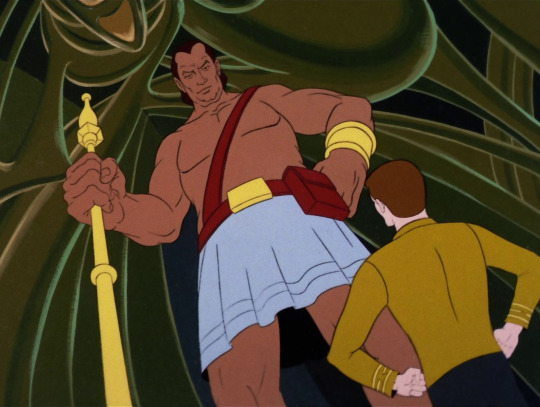
KIRK: Murderer! You've killed Spock!
G SPOCK: To persist in this behaviour, Captain, is to negate the eloquence of your previous argument. May I suggest a more constructive way?
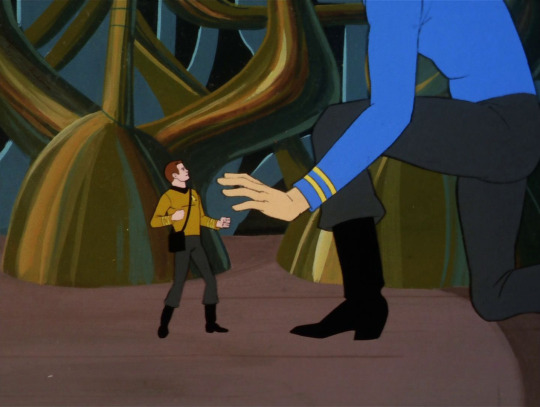
(The giant places a huge finger on Spock's head)

G SPOCK: My mind to your mind, my thoughts to your thoughts.
SULU: The Vulcan mind touch.
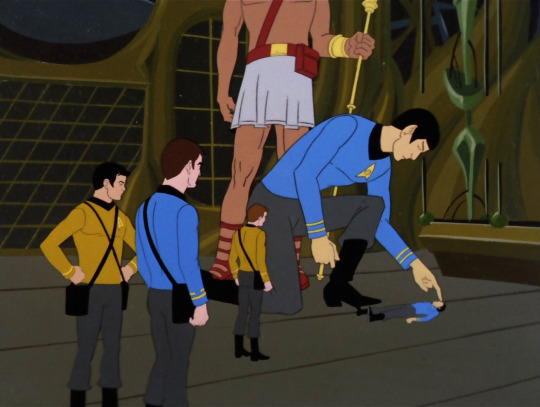

SPOCK: *Regains consciousness* I am pleasantly surprised at your capacity for deductive reasoning, Captain. When you are not being bellicose, there appears to be no end to your arsenal of formidable talents.
KIRK: Spock. Spock, you old --
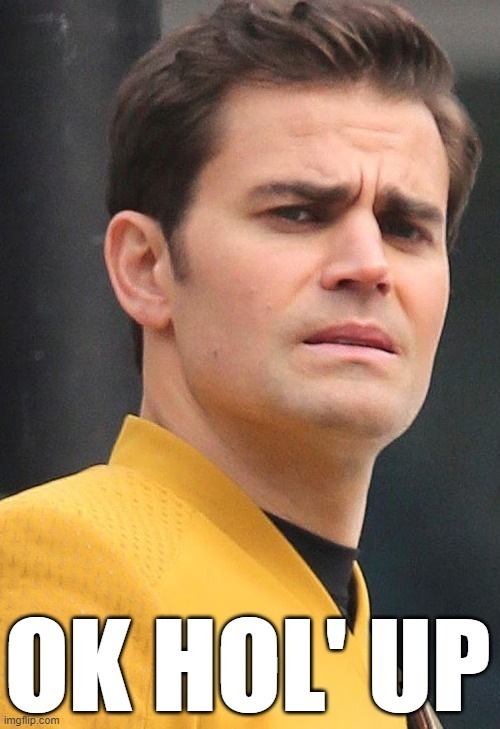
Ok I barely see my mans Spock give a compliment beyond "you have served adequately" or "it was satisfactory".
Now he out here falling all over himself for Jim Kirk hittin' him with that "Well, when you ain't throwin' hands, your eloquence and brilliance is endless."
Or, you know, "there appears to be no end to your arsenal of formidable talents."
What?
Arsenal of formidable TALENTS?!
Did any other crewmember within hearing range just stop, look at each other, and go "are you f**king kidding me?"

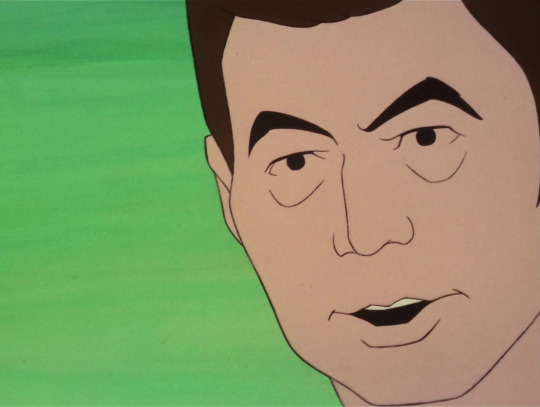
Please God tell me Bones latches on to that and never lets it go.
You get your katra back in your body for five seconds and first order of business? Flirt with Jim Kirk. LOL
I ain't never heard someone get such a raving, blatantly flattering compliment like this outta Spock in my life besides Jim Kirk.
Screencaps: TrekCore
#im going crazy about this#spirk meta#spirk#k/s#1shirt2shirtredshirtdeadshirt#octrekmeta#ocspirk#star trek#tos#spock#star trek tos#kirk/spock#kirk#kirkxspock#kirk x spock#jim kirk#TAS#the animated series#star trek the animated series#funny#mccoy#sulu#space husbands#flirting#compliments#spock is known for being ruthless about giving put compliments#he is supposed to be so bad at it#but LOOK AT THIS
195 notes
·
View notes
Text
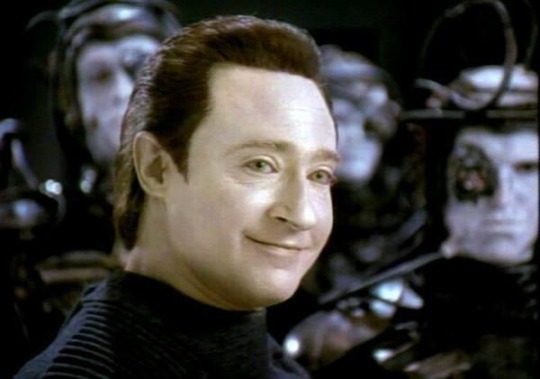
estrogen could save her
#i could elaborate but i won’t eventually maybe if i can write out a thought out meta#she is transfem u can’t change my mind#lore soong#lore star trek#star trek: tng#has id#tas lore
32 notes
·
View notes
Text


I'm thinking about Batman and duality and how in The Conroy TAS timeline...Harvey Dent and Bruce have always been really good friends and they've both always kinda been haunted by their circumstances in parallel ways. It's fascinating because their respective duality is totally different. Harvey Dent and Big Bad Harv are alters and it seems like Dent has been dealing with this repressed anger that develops into the alter of Big Bad Harv since he was a child. Meanwhile Bruce didn't become Batman in his own mind until right after his parents were killed by Joe Chill; which he then masks with how he thinks a rich, devil-may-care playboy would react to any social situation, creating "Brucie" Wayne as a public persona. Not to say that the care of Batman doesn't shine through, it certainly does in his humanitarian moments, but only as needed.
The tragedy being that, if Harvey Dent and Bruce Wayne talked to each other and were honest about their experiences and traumas(with some wiggle room, because Batman activity is Hella illegal), then they would be actually helpful to one another and better friends because of it.
Unfortunately because the Harvey/Two-Face system and Batman mostly cope with their traumas in solitude, they can't comfort each other at all and become adversaries even while being best friends.
16 notes
·
View notes